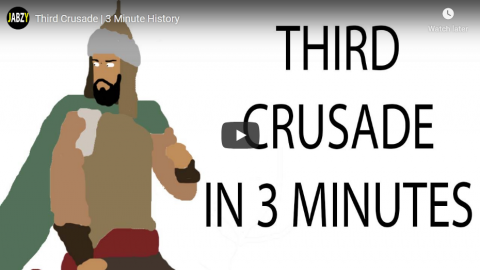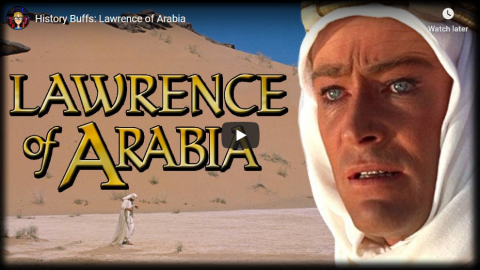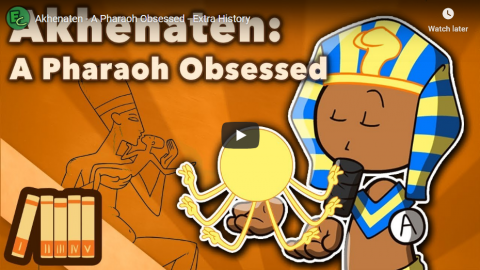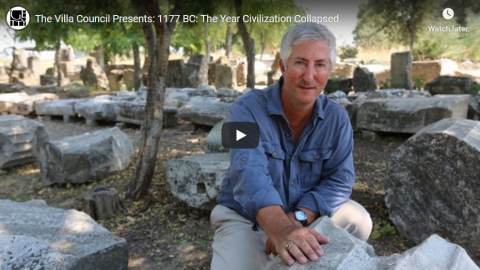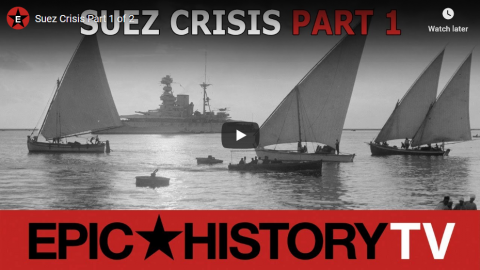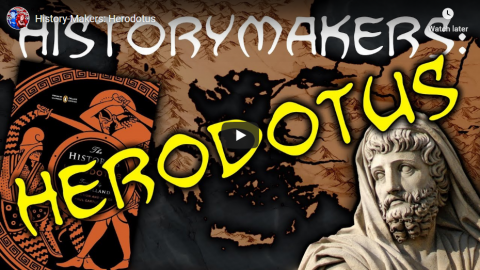Jabzy
Published 25 Jul 2015Thanks to Xios, Alan Haskayne, Lachlan Lindenmayer, William Crabb, Derpvic, Seth Reeves and all my other Patrons. If you want to help out – https://www.patreon.com/Jabzy?ty=h
March 31, 2020
Third Crusade | 3 Minute History
March 7, 2020
History Buffs: Lawrence of Arabia
History Buffs
Published 17 Apr 2016BIG THANK YOU TO THE GREAT WAR CHANNEL FOR COLLABORATING WITH ME AND MAKING AWESOME VIDEOS!
Check out their T.E. Lawrence video here –
https://www.youtube.com/watch?v=iqvcjL6ObH0And the rest of their awesome channel here 🙂
https://www.youtube.com/user/TheGreatWarAnd thank you History Buffs so very much for being patient whilst I was in Ireland working on the Vikings podcasts for the History Channel and moving house at the same time. I sincerely hope you guys enjoy this review!
● Follow us on Twitter: https://twitter.com/HistoryBuffsNH
_________________________________________________________________________
Lawrence of Arabia is a 1962 epic historical drama film based on the life of T. E. Lawrence. It was directed by David Lean and produced by Sam Spiegel through his British company Horizon Pictures, with the screenplay by Robert Bolt and Michael Wilson. The film stars Peter O’Toole in the title role. It is widely considered one of the greatest and most influential films in the history of cinema. The dramatic score by Maurice Jarre and the Super Panavision 70 cinematography by Freddie Young are also highly acclaimed. The film was nominated for ten Academy Awards and won seven in total including Best Director, Best Sound Editing, Best Film Editing, and Best Picture.
The film depicts Lawrence’s experiences in the Arabian peninsula during World War I, in particular his attacks on Aqaba and Damascus and his involvement in the Arab National Council. Its themes include Lawrence’s emotional struggles with the personal violence inherent in war, his own identity, and his divided allegiance between his native Britain and its army and his new-found comrades within the Arabian desert tribes.
In 1991, Lawrence of Arabia was deemed “culturally, historically, or aesthetically significant” and selected for preservation in the United States Library of Congress National Film Registry.
February 15, 2020
The Best Couples in History — Valentine’s Day Special
Overly Sarcastic Productions
Published 14 Feb 2020Happy Valentine’s Day! Celebrate the history of Love with a rundown of these outstanding couples — for better and for worse.
Our content is intended for teenage audiences and up.
This video was edited by Sophia Ricciardi, AKA “Indigo”.
PATREON: https://www.Patreon.com/OSP
DISCORD: https://discord.gg/h3AqJPe
MERCH LINKS: https://www.redbubble.com/people/OSPY…OUR WEBSITE: https://www.OverlySarcasticProductions.com
Find us on Twitter https://www.Twitter.com/OSPYouTube
Find us on Reddit https://www.Reddit.com/r/OSP/
January 25, 2020
Swedish K: The Carl Gustav m/45B and the Port Said
Forgotten Weapons
Published 24 Jan 2020http://www.patreon.com/ForgottenWeapons
https://www.floatplane.com/channel/Fo…
Cool Forgotten Weapons merch! http://shop.bbtv.com/collections/forg…
During the 1930s, Sweden acquired an assortment of different submachine guns, including Bergmanns, Thompsons, and Suomis. As World War Two progressed, they decided that they really needed to standardize on a single caliber and model of gun, and requested designs from both the Carl Gustav factory and Husqvarna. The Carl Gustav design won out, and was adopted as the m/45.
It was a very simple open-bolt, tube-receiver, fixed-firing-pin design chambered for 9x19mm Parabellum ammunition. The original guns were built around Finnish Suomi magazines, both 71-round drums and 50-round “coffin” mags. After the war these were replace by a new 36-round traditional box magazine, and magazine well adapters were fitted to the guns which precluded the use of the larger mags. The new magazines were much more convenient to carry, less expensive, and more reliable.
The name “Swedish K” comes form the full designation: Kulsprutepistol m/45. The guns were used by American special operations forces in Vietnam until the Swedish government stopped export sales to the US, at which point the Navy commissioned Smith & Wesson to produce the Model 76 submachine gun (essentially a copy of the m/45). The design was also licensed by Egypt, which also licensed the AG-42 Ljungman rifle at the same time. The Egyptian copy was called the Port Said, and shows the features fo the original Swedish m/45 pattern, where the guns in Swedish service were mostly updated to the m/45B pattern.
Photo of m/45C with bayonet from: http://www.gotavapen.se/index_eng2g.htm
Check them out for a ton of information on Swedish small arms!
Contact:
Forgotten Weapons
6281 N. Oracle #36270
Tucson, AZ 85740
January 17, 2020
Zionism, Arabism & Colonialism in the Middle East | BETWEEN 2 WARS I 1936 Part 1 of 3
TimeGhost History
Published 16 Jan 2020After more than twenty years of colonial management, promises made but few promises kept and ethnic & cultural clashes in the area, unrest in the Middle East erupts in violence. A series of movements originate in this time, with long lasting consequences.
Watch our episode about the Middle east in the 1920s here: https://youtu.be/y6tSvRbvh2s
Join us on Patreon: https://www.patreon.com/TimeGhostHistory
Hosted by: Indy Neidell
Written by: Joram Appel
Directed by: Spartacus Olsson and Astrid Deinhard
Executive Producers: Bodo Rittenauer, Astrid Deinhard, Indy Neidell, Spartacus Olsson
Creative Producer: Joram Appel
Post-Production Director: Wieke Kapteijns
Research by: Joram Appel
Fact-Checking by: Jonas Srouji
Edited by: Daniel Weiss
Sound design: Marek KaminskiSources:
Arab by LINECTOR from the Noun Project
Bomb by P Thanga Vignesh from the Noun ProjectColorizations by:
– Dememorabilia – https://www.instagram.com/dememorabilia/
– Adrien.Colorisation – https://instagram.com/adrien.colorisa…
– Norman StewartSoundtracks from Epidemic Sound:
– “Dawn Of Civilization” – Jo Wandrini
– “The Inspector 4” – Johannes Bornlöf
– “Easy Target” – Rannar Sillard
– “First Responders” – Skrya
– “Not Safe Yet” – Gunnar Johnsen
– “Deflection” – Reynard Seidel
– “The Charleston 3” – Håkan ErikssonA TimeGhost chronological documentary produced by OnLion Entertainment GmbH.
From the comments:
TimeGhost History
42 minutes ago (edited)
We have already covered “Carving up the Middle East” in one of our first Between Two Wars episodes (watch here: https://youtu.be/y6tSvRbvh2s), but we felt like we had to return to the area one more time as all that carving had quite some consequences. This means that a large part of this episode is about colonialism, Zionism, Arabism, race and ethnicity. I’m also aware of the complicated modern-day conflict in the area, many of which originate in [the events covered in] this episode. However, we would like the comment section to be reserved for debating the history. We’re not going to engage with people discussing modern-day issues and politics, and we’re going to be quite strict in monitoring any racist or otherwise hateful comments.Cheers,
Joram
January 9, 2020
Operation Compass 1940-41 | BATTLESTORM North African Campaign Documentary
TIK
Published 21 Dec 2015The most in-depth look at Operation Compass out there! Using animations and detailed maps, let’s find out what happened in one of the greatest British (and Commonwealth) victories of the war and who was responsible for the destruction of the Italian 10th Army. This video covers the start of the North African Campaign up to the Battle of Beda Fomm.
Sources:
Barnett, C. The Desert Generals. Weidenfeld & Nicolson, 2011.
Bierwirth, J. Beda Fomm: An Operational Analysis. Pickle Partners, 1994.
Christie H. Fallen Eagles: The Italian 10th Army in the Opening Campaign in the Western Desert, June 1940. Pickle Partners 1999.
Dimbleby, J. Destiny in the Desert. Britain 2013.
Moorehead, A. The Desert War: The Classic Trilogy on the North Africa Campaign 1940-43. Aurum Press, 2014.
Playfair, I.S.O. The Mediterranean and Middle East Volume 1: Early Successes against Italy [to May 1941]. 1954.
Wahlert, G. The Western Desert Campaign. Australia, 2011.Music is my own!
December 15, 2019
The Empire Strikes Back – Britain’s Operation Compass – WW2 – 068 – December 14, 1940
World War Two
Published 14 Dec 2019The First British offensive of the War begins in North Africa. Meanwhile, the German Knickebein system is designed for bombers to accurately bomb British targets at night. This is what the Brits do to stop them.
Join us on Patreon: https://www.patreon.com/TimeGhostHistory
Or join The TimeGhost Army directly at: https://timeghost.tvFollow WW2 day by day on Instagram @World_war_two_realtime https://www.instagram.com/world_war_t…
Join our Discord Server: https://discord.gg/D6D2aYN.
Between 2 Wars: https://www.youtube.com/playlist?list…
Source list: http://bit.ly/WW2sourcesWritten and Hosted by: Indy Neidell
Produced and Directed by: Spartacus Olsson and Astrid Deinhard
Executive Producers: Bodo Rittenauer, Astrid Deinhard, Indy Neidell, Spartacus Olsson
Creative Producer: Joram Appel
Post-Production Director: Wieke Kapteijns
Research by: Indy Neidell
Edited by: Iryna Dulka
Map animations: Eastory (https://www.youtube.com/c/eastory)Thumbnail Colorization (Archie Wavell) by:
– Julius Jääskeläinen – https://www.facebook.com/JJcolorization/Colorizations by:
– Dememorabilia – https://www.instagram.com/dememorabilia/
– Adrien Fillon – https://www.instagram.com/adrien.colo…Sources:
– IWM: F 4539, B 10600, CM 355, E 6600, E 3720E, E 1416, E 1378, E 4792
– Tropenmuseum, part of the National Museum of World Cultures– Prison icon by FORMGUT. from the Noun Project; Compass by RULI from the Noun Project.
Archive by Screenocean/Reuters https://www.screenocean.com.
A TimeGhost chronological documentary produced by OnLion Entertainment GmbH.
December 2, 2019
QotD: Evidence of markets in classical civilizations
If someone were to claim that market behaviour was peripheral to life in eighteenth century England, it would be easy to laugh at him. This is not to say the claim has not been or will not be made. But if it were made, it could be refuted with a mass of government and private statistics, of newspaper reports and law reports, of high literature, of sermons, speeches and letters, of descriptive and analytical surveys, of biographies and novels, and of physical remains. Ludicrous claims can always be based on selective and misread evidence. In this case, the weight of the evidence must be decisive.
If we turn, however, to the ancient world, the evidence must almost always be indecisive. Very few ancient writings have survived. Obviously, two thousand years are a long time; and ancient civilisation did collapse. Add to this that far fewer documents relating to economic matters were produced or could be preserved than has been the case with us. There was no printing: everything had to be copied by hand. The best writing material was papyrus, which was both expensive and fragile. The normal writing materials for accounts and administrative documents were waxed tablets, which were scraped and reused, and thin wooden sheets, which were thrown away once they had served their purpose.
The literary remains of Greece and Rome which have come down to us through generations of copying and recopying are the products of a rather snobbish culture, and contain little direct information about economic behaviour. The great writers, as Finley observes, do seem to have lacked the conceptual framework for intelligent discussion of finance and commerce. Even otherwise, these were matters they regarded as beneath the notice of history. Thucydides, for example, gives full discussion to the political causes of the Peloponnesian War, but says nothing of what we know from the archaeological evidence was the complete Athenian displacement of Corinth in the pottery markets of the Western Mediterranean world.
During the past century or so, the rubbish dumps of Egypt have revealed a mass of the everyday documentation we have for no other area of the ancient world. There are tax records, and commercial correspondence, and administrative commands, among much else. The problem here is that Egypt was always an exception. From its earliest history, its geography opened it to capture and exploitation by rent-seeking élites. The Pharaohs were worshipped as gods and given whatever they demanded. The Ptolemies organised the country into one gigantic state enterprise and used the proceeds for making a big noise in the Hellenistic world. The Roman Emperors kept up the monopolies and requisitions, treating Egypt as their personal property, and so far as possible isolating it from the rest of the Empire. The documentary evidence, therefore, we have from Egypt may not be representative of the ancient world as a whole.
But this, plus the material archaeology, is all we have. And if we want to know anything for economic motivations and behaviour, we must press the evidence we have as hard as we can. The history of the ancient world is, in many important respects like a mosaic that has been broken up with many of its tiles thrown away. The whole must be reconstructed from the parts remaining. It is a difficult enterprise, but it can be attempted.
If there is little direct, there is much indirect evidence. This is scattered through the surviving body of ancient literature. It consists of casual remarks, illustrations to arguments, even comments that are in themselves foolish. It is a question of looking for this evidence, and of knowing how to use it.
An interesting example of how evidence can be extracted and used comes not from our own ancient world, but from pre-Columbian South America. Deirdre McCloskey has looked at the geographical distribution of Mayan obsidian tools. She notes that, the farther from the sources of their obsidian, the smaller was the ratio of blade weight to cutting length. She comments:
By taking more care with more costly obsidian the blade makers were earning better profits; as they did by taking less care with less costly obsidian.
What we have here, then, is evidence that illiterate, stone age toolmakers were at least as conscious of opportunity cost as any Victorian mill owner, and rather more so than the average socialist planner of the next century. So long, of course, as this is evidence — this is, so long as the tools are distributed as claimed — we have empirical reason for doubting the Polanyi claim that,
previously to our time no economy has ever existed that, even in principle, was controlled by markets…. Gain and profit made on exchange never [before the nineteenth century] played an important part in human economy.
Sean Gabb, “Market Behaviour in the Ancient World: An Overview of the Debate”, 2008-05.
November 27, 2019
Herodotus’ Histories – Tom Holland
The Study of Antiquity and the Middle Ages
Published 24 Mar 2018The classical scholar Tom Holland introduces his new translation of Herodotus’ masterpiece – The Histories.
The Histories (Greek: Ἱστορίαι; Ancient Greek: [his.to.rí.ai̯]; also known as The History) of Herodotus is now considered the founding work of history in Western literature.
Written in 440 BC in the Ionic dialect of classical Greek, The Histories serves as a record of the ancient traditions, politics, geography, and clashes of various cultures that were known in Western Asia, Northern Africa and Greece at that time. Although not a fully impartial record, it remains one of the West’s most important sources regarding these affairs.
Moreover, it established the genre and study of history in the Western world (despite the existence of historical records and chronicles beforehand).
The Histories also stands as one of the first accounts of the rise of the Persian Empire, as well as the events and causes of the Greco-Persian Wars between the Achaemenid Empire and the Greek city-states in the 5th century BC. Herodotus portrays the conflict as one between the forces of slavery (the Persians) on the one hand, and freedom (the Athenians and the confederacy of Greek city-states which united against the invaders) on the other.
The Histories was at some point divided into the nine books that appear in modern editions, conventionally named after the nine Muses.
November 17, 2019
Akhenaten – A Pharaoh Obsessed – Extra History
Extra Credits
Published 16 Nov 2019Join us on Patreon! http://bit.ly/EHPatreon
A revolutionary dreamer or a tyrannical despot? That is a question at the heart of Akhenaten’s rule, a pharaoh so unusual, that his successors tried and almost successfully erased him from the historical records. You may know his more famous wife, Queen Nefertiti but Akhenaten was a fascinating ruler. He went against the grain of almost all of Egyptian traditions including trying to establish a monotheistic religion and unite the Upper and Lower Kingdoms of Egypt.
October 10, 2019
Suez Crisis Part 2 of 2
Epic History TV
Published on 28 Dec 2017In 1956, an international crisis over control of the Suez Canal put Britain and France into direct conflict with President Nasser of Egypt, a proud Arab nationalist determined to stand up to foreign powers meddling in Egyptian affairs.
Part 2 explores how Britain, France and Israel cooked up a secret plan to invade Egypt, overthrow Nasser and reassert their standing as global powers. But when the international community, and in particular the United States, condemned their actions, the aggressors were forced into a humiliating climbdown. The repercussions for the Middle East and global history were long-lasting and profound.
Archive film from AP Archive http://www.aparchive.com/
Music from Filmstro https://www.filmstro.com/
Get 20% off an annual license! Use our exclusive coupon code:EPICHISTORYTV_ANNHelp me make more videos by supporting Epic History TV on Patreon https://www.patreon.com/EpicHistoryTV
Further Reading on Suez Crisis (click affiliate links to buy on Amazon & support the channel):
Blood and Sand, Alex von Tunzelmann (Simon & Schuster, 2016) http://geni.us/QyoWs
Suez: Britain’s End of Empire in the Middle East, Keith Kyle (I.B.Tauris, 2011) http://geni.us/aqn6AH
The Suez Crisis 1956, Derek Varble (Osprey, 2003) http://geni.us/ANxBQEE
“Suez 1956”, Timothy Benson in History Today (Nov 2006)
“Suez: The Canal Before the Crisis”, Steve Morewood in History Today (Nov 2006)
“Nasser, Suez and Arab Nationalism”, Michael Scott-Baumann in History Today (Mar 2010)
“The First Suez Crisis”, Christopher Danziger in History Today (Sep 1982)
The Suez Crisis, by Laurie Milner, BBC website http://www.bbc.co.uk/history/british/…
“Andrew Bacevich reviews ‘Eisenhower 1956′”, London Review of Books (Vol.33 No.12)
“Avi Shlaim reviews ‘Israel’s Border Wars, 1949-56′”, London Review of Books (Vol.16 No.16)#EpicHistoryTV #SuezCrisis #ColdWarHistory
October 9, 2019
The Villa Council Presents: 1177 BC: The Year Civilization Collapsed
Getty Museum
14 Jun 2016Noted historian and archaeologist Eric Cline discusses the themes of his Pulitzer Prize-nominated book 1177 BC: The Year Civilization Collapsed and takes a closer look at why Mediterranean societies of the Late Bronze Age — with their complex cosmopolitan and globalized world-systems — came to a dramatic halt. He considers the similarities and parallels of our contemporary civilization, making the chain of interconnected events more than simply a study of ancient history.
Photo: Blink Films
May 22, 2016
The Getty Villa, Malibu, CaliforniaFind out what’s on now at the Getty:
http://www.getty.edu/360/
#gettytalks
Suez Crisis Part 1 of 2
Epic History TV
Published on 22 Dec 2017In 1956, an international crisis over control of the Suez Canal put Britain and France into direct conflict with President Nasser of Egypt, a proud Arab nationalist determined to stand up to foreign powers meddling in Egyptian affairs.
To understand the deep roots of the crisis we go right back to the creation of the canal in 1869, and the long history of British intervention in Egypt — all with the usual Epic History TV maps as well as loads of brilliant and rarely-seen archive film from the period.
Archive film from AP Archive http://www.aparchive.com/
Music from Filmstro https://www.filmstro.com/
Get 20% off an annual license! Use our exclusive coupon code:EPICHISTORYTV_ANNHelp me make more videos by supporting Epic History TV on Patreon https://www.patreon.com/EpicHistoryTV
Further Reading on Suez Crisis (click affiliate links to buy on Amazon & support the channel):
Blood and Sand, Alex von Tunzelmann (Simon & Schuster, 2016) http://geni.us/QyoWs
Suez: Britain’s End of Empire in the Middle East, Keith Kyle (I.B.Tauris, 2011) http://geni.us/aqn6AH
The Suez Crisis 1956, Derek Varble (Osprey, 2003) http://geni.us/ANxBQEE
“Suez 1956”, Timothy Benson in History Today (Nov 2006)
“Suez: The Canal Before the Crisis”, Steve Morewood in History Today (Nov 2006)
“Nasser, Suez and Arab Nationalism”, Michael Scott-Baumann in History Today (Mar 2010)
“The First Suez Crisis”, Christopher Danziger in History Today (Sep 1982)
The Suez Crisis, by Laurie Milner, BBC website http://www.bbc.co.uk/history/british/…
“Andrew Bacevich reviews ‘Eisenhower 1956′”, London Review of Books (Vol.33 No.12)
“Avi Shlaim reviews ‘Israel’s Border Wars, 1949-56′”, London Review of Books (Vol.16 No.16)#EpicHistoryTV #SuezCrisis #ColdWarHistory
September 24, 2019
QotD: Conditions for the rise of tyrants in the Greek city states
The central problem of almost every society before about 1950 has been how to reconcile the great majority to distributions of property in which they are at a disadvantage. Only a minority has even been able to enjoy secure access to abundant food and good clothing and clean water and healthcare and education. Whether actually enslaved or formally free sellers of labour, the majority have always had to look up to a minority of the rich who are often legally privileged. How to keep them quiet?
Force can only ever be part of the answer. The poor have always been the majority, and sometimes the great majority. Armies of mercenaries to protect the rich have not always been available, and they have never by themselves been sufficient to compel obedience on all occasions in every respect.
Force, therefore, has always been joined by religious terrors. In Egypt, the king was a god, and the privileged system of which he was the head was part of a divine order that the common people were enjoined never to challenge. In the other monarchies of the near east, the king might not actually be a god. But all the priests taught that he was part of a divinely ordained order that it was blasphemy to challenge.
In the Greek city states until about a century before the birth of Epicurus, securing the obedience of the poor had not been a serious problem. There had been some class conflict, even in Athens. But most land was occupied by smallholders, and excess population could be decanted into the colonies of Italy and the western Mediterranean. There were rich citizens, but they were usually placed under heavy obligations to contribute to the defence and ornament of their cities.
Then a combination of commercial progress and the disruptions of the war between Athens and Sparta created a steadily widening gulf between rich and poor. There was also a growing problem of how to maintain large but unknown numbers of slaves in peaceful subjection.
The result was a class war that destabilised every Greek state. The sort of democracy seen in Athens could survive in a society where citizens were broadly equal. Once a small class of rich and a much larger class of the poor had emerged, there was a continual tendency for democratic assemblies to be led by demagogues into policies of levelling that could be ended only by the rise of a tyrant, who would secure the wealth of the majority — but who could secure it only so long as the poor could be terrified into submission. Once they could not be terrified by the threat of overwhelming force, they would rise up and dispossess the rich, until a new tyrant could emerge to subdue them again.
Unlike in the monarchies of the near east, no settled order could be maintained in Greece by religious terrors. During the sixth and fifth centuries, the Greek mind had experienced the first enlightenment of which we have record. There had been a growth of philosophy and science that revealed a world governed by laws that could be uncovered and understood by the unaided reason.
Now, enlightenments are always dangerous to an established religion. And the Greek religion was unusually weak as a counterweight to reason. The Greeks had no conception of a single, omnipotent God the Creator. Instead, they had a pantheon of supernatural beings who had not created the world, but were subject to many of its limitations. These were frequently at war with each other, and so they could be set against each other by their human worshippers with timely sacrifices and other bribes. They did not watch continually over human actions, and beyond the occasional punishment and reward to the living, they had no means of compelling observance of any code of human conduct.
And so, when the intellectual disturbance of philosophy and science spilled over into demands for a reconstruction of society in which property would be equalised, there was no religious establishment with the authority to stand by the side of the rich.
Sean Gabb, “Epicurus: Father of the Englightenment”, speaking to the 6/20 Club in London, 2007-09-06.
September 16, 2019
History-Makers: Herodotus
Overly Sarcastic Productions
Published on 13 Sep 2019Signup for your Free trial to The Great Courses Plus here: http://ow.ly/diiG30oC0Lk
There is much to do, and many unknowns on our horizon! — One of those unknowns is “How did Herodotus become the Father of History” and why is his book so confusingly organized? All that and more on this installment of History-Makers!
Let me know which History writer you’d like me to discuss next in the comments below!
PATREON: https://www.Patreon.com/OSP
DISCORD: https://discord.gg/sS5K4R3
MERCH LINKS: https://www.redbubble.com/people/OSPY…
OUR WEBSITE: https://www.OverlySarcasticProductions.com
Find us on Twitter https://www.Twitter.com/OSPYouTube
Find us on Reddit https://www.Reddit.com/r/OSP/— — —
The Great Courses Plus is currently available to watch through a web browser to almost anyone in the world and optimized for the US, UK and Australian market. The Great Courses Plus is currently working to both optimize the product globally and accept credit card payments globally.

